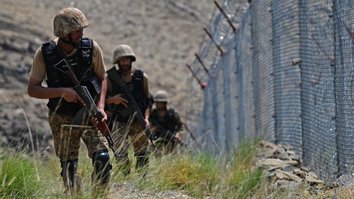ISLAMABAD -- A Pakistani crackdown on terror groups is forcing them to collaborate on attacks, say officials and analysts.
The Tehreek-e-Taliban Pakistan (TTP) in statements on its official channel last Saturday and Sunday (June 3–4) claimed that two attacks on Pakistani security forces in Bannu district and North Waziristan districts of Khyber Pakhtunkhwa were made in co-operation with a group led by Hafiz Gul Bahadur.
Bahadur, a militant commander based in North Waziristan, has been operating in the region and is linked to two less-known militant groups -- the Da Ghazyano Karwan and the Jaish Fursan Muhammad.
While Bahadur's group has previously not allied with the TTP, both groups have ties to al-Qaeda.
![Senior Pakistani police officers on May 31 attend the funeral of a policeman who was killed in a TTP attack in Mohmand district. [Khyber Pakhtunkhwa Police]](/cnmi_pf/images/2023/06/07/42460-pf_alliance_photo_2-585_329.jpg)
Senior Pakistani police officers on May 31 attend the funeral of a policeman who was killed in a TTP attack in Mohmand district. [Khyber Pakhtunkhwa Police]
The TTP in its two statements did not give further details about the operational co-operation with the Bahadur-led group.
The collaboration between the two is an indication of the weakening of the militant groups because of an ongoing crackdown and the killings and arrests of key commanders, say observers.
"Both groups briefly were part of the Shura Ittehad-ul Mujahideen, an alliance formed in 2009 by al-Qaeda to remove differences among the local militants. But the alliance did not last long," said Muhammad Shah Wazir, a political activist in North Waziristan.
"Since then, the Bahadur-led group and the TTP have made an operational alliance to carry out joint attacks on Pakistan's security and police forces," he said.
The recent alliance "clearly shows that Pakistan's operations against the groups have diminished their ability to find new recruits and carry out terror attacks in the region", Wazir told Pakistan Forward.
Weakening of militant groups
Recent arrests and killings of the TTP's high-profile commanders, including Iqbal (also known as) Bali Khayara, have weakened the militant group, an official at the KP Police Counter Terrorism Department (CTD) in Peshawar said on the condition of anonymity.
Iqbal was killed on May 4 in a shootout with police in Dera Ismail Khan, KP.
He was associated with al-Qaeda and Lashkar-e-Jhangvi and masterminded several high-profile attacks, including the 2009 attack on the visiting Sri Lankan cricket team in Lahore and the 2008 suicide bombing of a Dera Ismail Khan hospital.
On May 14, the CTD arrested a TTP militant from Bannu in connection with his alleged nvolvement in the assassination of CTD senior officer Iqbal Mohmand.
Mohmand and three other policemen were killed on March 30 when their vehicle struck a roadside bomb in Lakki Marwat district.
In its latest progress report, the CTD observed that incidents of terrorism in the province declined by 11.9% in April, compared to the previous three months of the year.
The recent rise in operational co-operation between the TTP and Bahadur-led group suggests that the two may be forced to create a formal alliance in order to survive, said the KP CTD official.
Since the Pakistani crackdown has weakened the two groups and has "reduced their ability to strike Pakistan's security forces", they have been forced to adapt, he said.
As a result, they have attacked softer or more isolated targets, such as "policemen guarding polio vaccinators", he explained.
The TTP claimed responsibility for a May 31 attack on a polio vaccination team in North Waziristan that killed a security officer guarding the team.

![Law enforcement personnel on June 5 carry out an operation against militant groups in the mountains of Buner district, Khyber Pakhtunkhwa. [Khyber Pakhtunkhwa Police]](/cnmi_pf/images/2023/06/07/42461-pf_photo_1_alliance-585_329.jpg)






